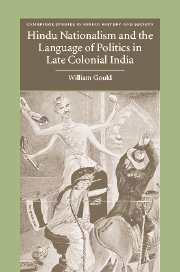Book contents
- Frontmatter
- Contents
- Acknowledgements
- Glossary
- List of abbreviations
- 1 Introduction
- 2 Congress and the Hindu nation: symbols, rhetoric and action
- 3 Muslims, mass movements and untouchable uplift
- 4 The Aryan Congress: history, youth and the ‘Hindu race’
- 5 Congress radicals and Hindu militancy
- 6 Congress ‘Raj’, riots and Muslim mass contacts
- 7 Congress, Pakistan and volunteer militarism
- 8 Conclusion
- Bibliography
- Index
- Other titles in the series
5 - Congress radicals and Hindu militancy
Published online by Cambridge University Press: 11 July 2009
- Frontmatter
- Contents
- Acknowledgements
- Glossary
- List of abbreviations
- 1 Introduction
- 2 Congress and the Hindu nation: symbols, rhetoric and action
- 3 Muslims, mass movements and untouchable uplift
- 4 The Aryan Congress: history, youth and the ‘Hindu race’
- 5 Congress radicals and Hindu militancy
- 6 Congress ‘Raj’, riots and Muslim mass contacts
- 7 Congress, Pakistan and volunteer militarism
- 8 Conclusion
- Bibliography
- Index
- Other titles in the series
Summary
The arguments of this book have so far stressed the importance of ideologies and languages of politics in generating ideas about nation and community. These languages of politics suggest that it is difficult to talk of a single Congress ‘party’, working and behaving according to a single coherent set of principles. If the ‘secular’ Congress was able to accommodate the Arya Samaj so easily, it is more appropriate to study the Congress in terms of its multifarious membership. Any study of Hindu nationalism and its relationship to ‘communalism’ must also discuss the role and ideas of these individual politicians. There has been ambivalence in historical writing about the relative importance of leaders, communal or otherwise, and their manipulation of religious rhetoric. The gears of communal conflict, it has been argued, were lubricated by competition over social and political resources, rather than the deliberate manipulation of religious symbols, or institutional alliances such as those that existed between the Congress and Arya Samaj. It has been seen that the cloth boycotts and untouchable uplift movement of civil disobedience bore a relationship to Hindu–Muslim conflict in Agra, Banaras, Allahabad, Kanpur, Lucknow and a host of smaller towns. In these situations, both competition for space and resources and political ideologies played their part. Untouchable uplift, for example, raised questions of political representation and power, as well as the symbolic and emotional significance of a rejuvenated and unified ‘Hindu community’.
- Type
- Chapter
- Information
- Publisher: Cambridge University PressPrint publication year: 2004



